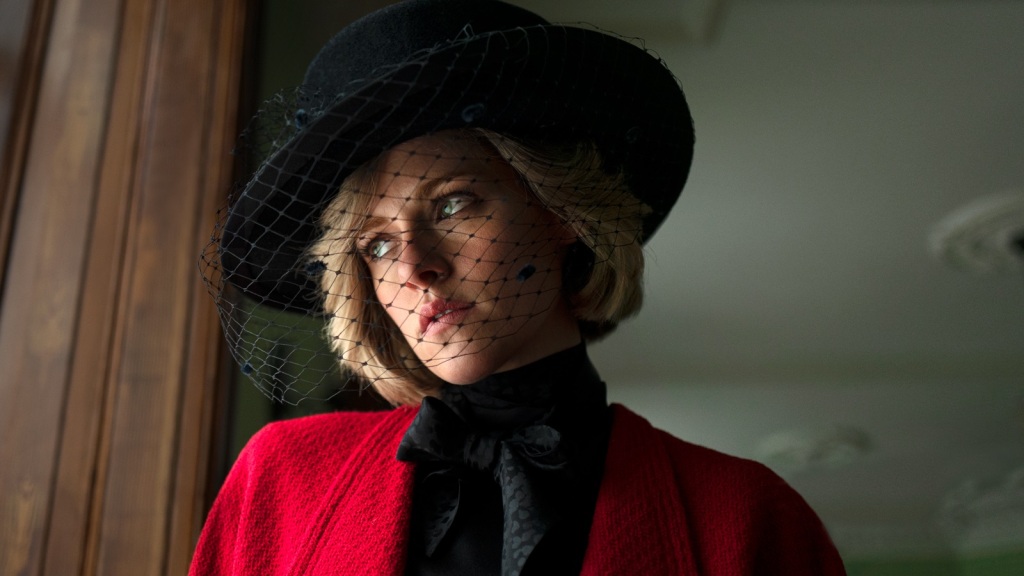Keep Noise to a Minimum: They Can Hear You.
Kitchen sign at Sandringham
Pablo Larraín‘s poetic, mysterious and subversively cathartic Spencer (2021) emerges as a companion piece to his previous work, the heartbreakingly operatic Jackie (2016) – two uniquely powerful, metaphorically subjective films about two very different women sharing one key similarity – an unimaginable amount of worldly fame.
Jacqueline Kennedy, reserved, sophisticated, and elitist at core, dealt with tragedy by moving inward, removing herself from the crowd, maintaining her distance and image, and more importantly – her dead husband’s legacy, with a steely resolve of a master political manipulator; an understanding of history exceeding any of the many statesman who fell at her feet.
The Princess of Wales, formerly Lady Diana Spencer, possessed an entirely different sort of political mastery, and in my mind, significantly more potent – as she knew, by talent of deep empathy, just what any person standing in front of her needed most. In their hearts.
In truth, Diana, the populist, was a polar opposite of Jackie — her main drive to deconstruct the artifice, humanising the enshrined.
There seem to be as many depictions of Diana on screen, as there are of WWII – to paraphrase something I once read about all the books being written on Marilyn Monroe (and indeed, there are many eerie parallels between these two icons of wounded femininity); but none I saw came nearly as close to the essence of Diana’s incredible personal charisma, complexity, and popularity, as this film does, so strangely precisely.
The reasons why Larraín manages to capture the spirit of Diana with such respect and authenticity are indeed to do with his heartfelt artful direction, as well as his perfect casting (equally, with Jackie), but more so with his allowing a mystical element into the storytelling, as both films seem to achieve what a medium in its primary function is meant to facilitate – and that is to channel.
This is most obviously enacted through a book left on Diana’s bedside at the very beginning of Spencer – as Diana herself suspects, by a company military man, appointed to keep an eye on her during the festivities (a perfectly sinister Timothy Spall). It was a biography of the beheaded Anne Boleyn. However, rather than serving as intended intimidation, Boleyn (Amy Manson), the ghost, becomes Diana’s saving grace.
Everything in this tale is carefully placed, both as sign, and as premonition.
Thus, we are summoned to witness the possible unfolding of events during the 1991 family Christmas at Sandringham estate, with Diana in turmoil, shunned, stifled, and gaslit, struggling with all her considerable inner resources, in her most fragile mental and emotional state, to break away from her infamously unhappy marriage, and the delicately crafted duplicity of a surface royal existence. In one poignant encounter, Prince Charles (Jack Farthing) defines for Diana this state of duality as the need for always being two of oneself, one kept for private – and one performed for the public.
It was most likely Diana’s incredible singularity that finally won her the freedom she desired.
Kristen Stewart‘s great capacity of completely inhabiting a character while remaining unchanged has been offered full range of expression in Spencer, fitting the narrative like a white silken glove. As Diana, she entirely embodies the fiercely independent soul submerged deeply into the archetypal, a place where she is thereby forever chained to all the other souls acting as vessels to a national storyline. For an offer of wealth, power and immortality, yet bound by form and duty, this is the realm where one is required to abandon essential fragments of one’s humanity as not to disturb a current of relentless bloodline succession, symbolically defining a territory, and lasting a millennium.
The Princess of Wales, as fallible as she was, managed the unthinkable – nearly fatally disrupting this inherently self-serving force, which equally emphasises its service to a nation, with an abundant humanity that seemed only to grow by each new encounter with a fellow being outside this unforgiving pattern. A trait most lovingly displayed in her encounters with Maggie, played by the wonderous Sally Hawkins, her royal dresser, and Darren, a kindly, muscular Sean Harris, the royal head chef of the household.
This is what in earnest lies at the bottom of that steady defiance Diana publicly exhibited from early on in her marriage, and which, with warm maternal determination, we see her intent on imprinting onto her two sons, her key narrative allies (Jack Nielen as William, and Freddie Spry as Harry).
Finally, with the scenes of Diana desperately, clumsily, stubbornly attempting to return to her vacant, boarded and decaying home, the Spencer mansion, located close by, running across the frozen fields to a future entirely unknown to her, but known to us, then ballet-dancing her way through the labyrinthine Sandringham halls, and out of confinement – Larraín, as well as Steven Knight, who penned this masterpiece, Jonny Greenwood, with his divinely Gothic score, and Claire Mathon with her soft dreamscape photography, achieved a cinematic miracle which unequivocally makes clear to all watching why Diana mattered so much, to so many.
It has something to do with love.
This is alchemical cinema, at its finest.
★★★★★
Author: ©Milana Vujkov
